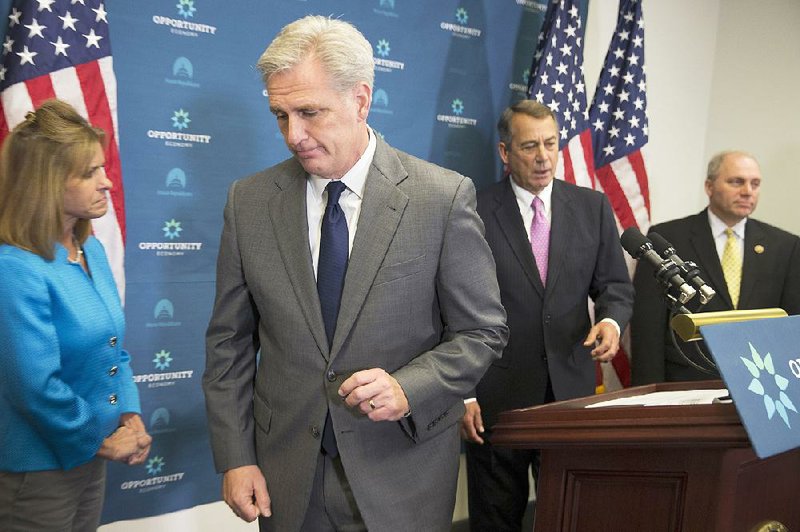WASHINGTON -- Congress on Wednesday sent President Barack Obama a $612 billion defense policy bill that he has threatened to veto in an ongoing battle between Democrats and Republicans about government spending.
The Senate approved the measure 70-27. Arkansas' U.S. Sens. John Boozman and Tom Cotton, both Republicans, voted for the measure.
RELATED ARTICLES
http://www.arkansas…">House OKs Hill's bill to delay bank rebukehttp://www.arkansas…">Benghazi probe: McCarthy quip a human errorhttp://www.arkansas…">House sets review of Planned Parenthood http://www.arkansas…">Crawford floats Cuba trade bill
If Obama vetoes the defense bill, it would be the fifth time that has happened in the past half-century. The bipartisan measure has become law every year for more than 50 years.
The House passed the bill last week, 269-151, with enough Democratic votes to sustain a presidential veto.
Obama has said he'll veto it because while it contains all of the money he requested, he doesn't like the way Congress accomplishes it. The bill increases defense spending by padding a separate war-fighting account with an extra $38 billion. Congress didn't increase money for domestic agencies as the president wants.
If the veto is sustained, Congress would be forced to revise the bill or try to settle the larger budget dispute.
Senate Majority Leader Mitch McConnell, R-Ky., said the president's desire to veto the bill is "outrageous" in the light of national security threats.
"I wish I could say it surprised me that President Obama might -- for the sake of unrelated partisan games -- actually contemplate vetoing a bipartisan defense bill that contains the level of funding authorization he asked for," McConnell said on the Senate floor. "I'm calling on him not to, especially in times like these."
Sen. Jack Reed of Rhode Island, the ranking Democrat on the Senate Armed Services Committee, said it was a good bill. He cited 60 provisions aimed at helping streamline defense acquisitions. He said other parts of the bill would help the Defense Department keep pace with changing technology and combat cyberattacks; and provide key funding for the war in Afghanistan, for the fight against Islamic State militants and for Ukraine forces fighting Russian-backed rebels.
But he said he could not support it because it increases the war-fighting account, raising defense spending by doing an end-run around the spending caps.
Adding funds to the account for Overseas Contingency Operations complicates defense spending, he said. It does not provide funds for many of the domestic agencies, such as the FBI, Coast Guard, Justice Department, because they remain subject to the spending caps.
"Defense budgeting needs to be based on our long-term military strategy," he said. "A one year plus-up" to the special account does not provide the Pentagon "with the certainty and stability it needs when building its five-year budget."
After the vote, Republican House Speaker John Boehner issued a statement pressuring Obama to sign the bill.
Sen. John McCain, chairman of the Senate Armed Services Committee, and Rep. Mac Thornberry, chairman of the House Armed Services Committee -- both Republicans -- called a news conference to pressure Obama to sign it.
"I continue to hope that the president just won't veto it -- that there will be sufficient pressures on him that he won't veto," McCain said.
Thornberry said he, too, hoped the president would reconsider his veto threat, especially in light of the strong votes of support in both chambers.
"There has been a total of four [defense bill] vetoes in the past 53 years ... every one of them were because of something that was in the bill, not because of something that was outside the bill, which is the thing that the president is complaining about today," Thornberry said.
White House spokesman Josh Earnest said Wednesday that the bill makes use of a "funding gimmick that some Republicans have called a slush fund, to try to provide for the basic national security of the United States in a way that the president and commander-in-chief finds grossly irresponsible."
In other news from Washington, Obama signed legislation Wednesday evening aimed at preventing insurance premium increases that some smaller businesses were expecting next year under his signature health care law, the White House said.
Both parties supported the legislation to revamp part of the Patient Protection and Affordable Care Act.
Under the Affordable Care Act, companies considered small businesses must offer certain required benefits. Business groups had complained that many employers' health care costs would increase as a result.
Previously, small businesses were defined as those having up to 50 employees. That number was set to expand to 100 on Jan. 1.
The new law keeps the small-business definition at 50 workers but allows states to increase the number if they choose.
A Section on 10/08/2015

